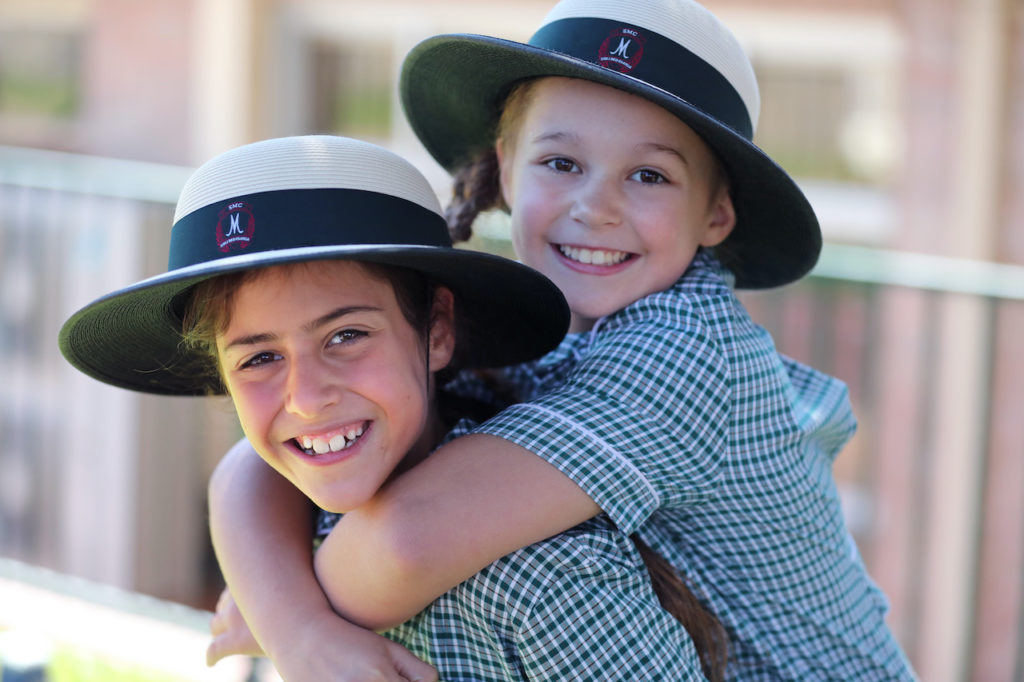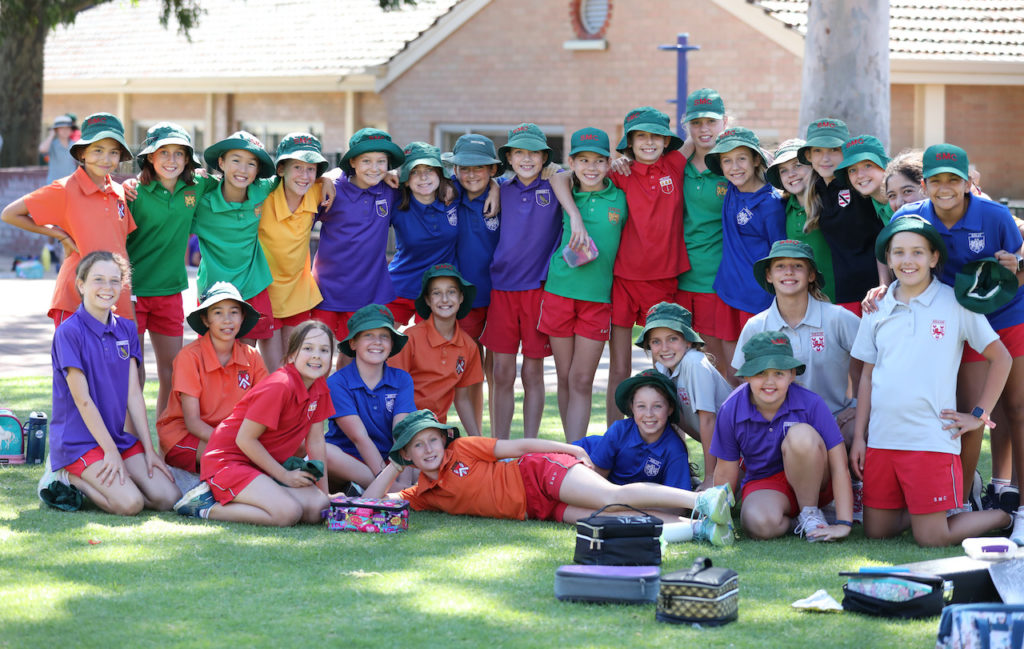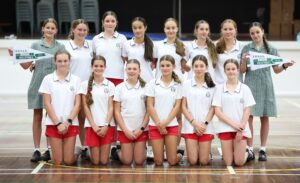What Does Pastoral Care Mean in a School?

Children are more likely to thrive in their learning when they feel cared for and valued. That isn’t just a nice idea; it is a researched and proven tenet of good teaching practice. At Santa Maria College, we attend to a child’s social and emotional wellbeing via a three-pronged approach. We invest in:
- student care
- social-emotional learning
- spiritual wellbeing.
We call the combination of these three elements pastoral care.
Relationships Between Staff and Students
At its most basic level, pastoral care is about relationships. We believe that every student needs at least one significant adult in the school. Most have more. These relationships ensure our students do not ever ‘fall through the cracks’ – our girls are far too valuable for that to be allowed to happen.
All school staff are involved in pastoral care, but the most obvious are:
- Director of Pastoral Care
- Director of Mission
- Deans of Students
- House Coordinators
- Homeroom teachers
- Classroom teachers
- Student Services.
Specialised Staff
At Santa Maria, we have specialised Health Services staff to lend their expertise when circumstances are more complicated. They include:
- Psychologists
- Nurses
- Enrichment staff.
Partnership with Home
The role of a school is to help parents raise a child. Parents have the essential relational knowledge of their children, and schools add expertise in learning and increasingly in social-emotional care. It is essential that we recognise each other’s expertise and work together for the best outcomes for our kids.
A good school is a conversation school. Staff and parents need to be connected and share a level of trust. If there is a problem at school, staff need to communicate with parents. If there is a problem at home that will impact a child, that needs to be shared with the school.
These days, we rely heavily on digital platforms to communicate. This is fine for sharing results and logistical information. However, when it comes to our children’s wellbeing, we need good, old-fashioned, face-to-face conversations. It is amazing how much more effectively schools and parents can partner when they speak to one another.
Social-Emotional Curriculum
Santa Maria College is one of the very few schools in Australia to have a dedicated social-emotional curriculum. The College views this learning as important enough to allocate it time in each and every school week.
The social-emotional curriculum is carefully planned across Years 5 – 12. It offers students skills and learnings in five key areas: self-awareness, social awareness, self-management, social management and spirituality.
This curriculum offers students skills and understandings that complement what parents are teaching at home. The beauty of teaching the skills in our school environment is that students have the opportunity to practise.
Spirituality
Spirituality and values-based education are the defining feature of a religious-order school. Santa Maria College is a Mercy school. The rites and rituals of the Catholic Church give students a sense of belonging and the knowledge that they are never alone.
Our Religious Education lessons give our students knowledge of their religion and allow them to investigate and question ideas in a healthy and respectful manner. Meanwhile, the Service program teaches girls how to put their faith into action by using their gifts and talents to help others and contribute to their local and global communities.

Special Programs
Bishop Desmond Tutu said, “There comes a point where we need to stop just pulling people out of the river. We need to go upstream and find out why they’re falling in.”
At Santa Maria College we agree that prevention is key. Our Mental Health Strategy is testimony to the importance we place on this sphere of learning. It was developed in consultation with students, parents and staff.
Orientation programs are extremely important. It is in these early days that our girls begin to feel a sense that they belong and are connected at school. As we know, connection is vital to both their sense of wellbeing and their academic progress. Orientation programs exist for every student who enters the College, regardless of which year group they join.
Similar processes are in place at the other major transition points of a girl’s education at Santa Maria. There are orientation processes for Year 7 and a psychologist-designed transition program at the end of Year 9 before entering the Senior Years, called Reason for Being.
Our Reflection Days consist of spirituality and positive mental health programs. Each girl participates in a Reflection Day every year they are at Santa Maria College. In Year 12 it takes the form of a three-day camp. It is a rite of passage and a highlight of the girls’ education.
The Years 5 and 6 Friendship Curriculum
Early adolescence is a period of enormous social growth. Our children become very aware of friendships and the need to belong. In their social interactions with peers, we fully expect that our girls will fall into their competency gaps – they are beginning learners in the spheres of emotional intelligence and relationships, after all. These mistakes are good; they allow for growth. To aid with that growth, we provide friendship lessons in Years 5 and 6. In these lessons, we explore the understandings, skills, and behaviours required for contentment and success in this sphere of life.
Balance
Balance is a long-standing and highly successful program run in both the school and the boarding school. It is run by a passionate staff member with psychology training. In the program, students talk about nutrition, exercise, friendships and daily stressors. They are also given tools to better manage the challenges they face.
Camps
Camps in Years 6, 7 and 9 provide opportunities for intensive skill building in social-emotional learning, calculated risk taking and practical skills for life. The camps are also great fun. For some students, the Year 6 Camp is their first experience of staying away from home without family. For others, it is a great opportunity to lead and offer support to other students. For all students, camps are a highlight of their time at school.
Promoting Access to Services
It would be a mistake to think that all a child’s issues can be dealt with at school. There are so many wonderful health professionals who dedicate their lives to studying and practising in specialised areas of adolescent care. We acknowledge and utilise their expertise.
Santa Maria does not provide ongoing one-on-one physical or mental health care. Of course, our staff are highly effective at point of need, but ongoing care needs to be managed by outside services. Our staff will help you access external providers and act as a conduit between those services and the College when necessary.
In Conclusion…
If a child is not well physically and emotionally, it will be very hard for them to thrive in their learning. It is also essential that we equip all students with the social and emotional skills needed for life. In partnership with you, we are well placed to achieve our aims.

Santa Maria Teams Shine in Term 1 Sports
Santa Maria had a huge number of girls in the IGSSA AFL and Volleyball competition with strong results for a number of teams.

Lee-Elle’s Insights from the ‘Make it 16’ Forum
Lee-Elle Cooper is a passionate Year 12 student who advocates for youth engagement and political participation. She has recently returned from the Make It 16 Forum in Canberra.

With Laurissa Knowles From Valley Depths to Mountain Peaks (1993)
Laurissa Knowles (1993) has had an incredible career journey so far, from Santa Maria College Teacher to Celebrant and Councillor.
Author: Santa Maria College
Santa Maria College is a vibrant girls school with a growing local presence and reputation. Our Mission is to educate young Mercy women who act with courage and compassion to enrich our world. Santa Maria College is located in Attadale in Western Australia, 16 km from the Perth CBD. We offer a Catholic education for girls in Years 5 – 12 and have 1300 students, including 152 boarders.







